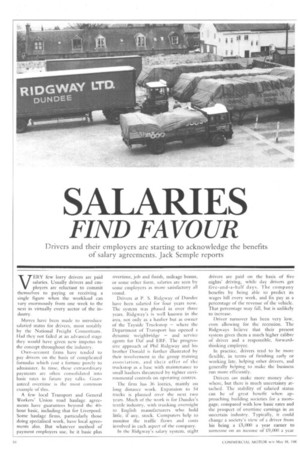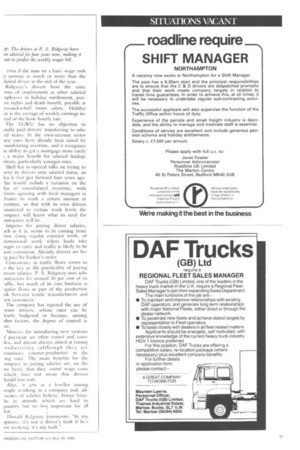SALARIES
Page 56

Page 57

If you've noticed an error in this article please click here to report it so we can fix it.
FIND FAVOUR
Drivers and their employers are starting to acknowledge the benefits of salary agreements. Jack Semple reports
VERY few lorry drivers arc paid salaries. Usually drivers and employers are reluctant to commit themselves to paying or receiving a single figure when the workload can vary enormously from one week to the next in virtually every sector of the industry.
Moves have been made to introduce salaried status for drivers, most notably by the National Freight Consortium. Had they not failed at an advanced stage they would have given new impetus to the concept throughout the industry.
Own-account firms have tended to pay drivers on the basis of complicated formulas which cost a fortune purely to administer. In time, these extraordinary payments are often consolidated into basic rates in future pay talks. Guaranteed overtime IS the most corn mon example of this.
A few local Transport and General Workers' Union road haulage agreements have guarantees beyond the 40hour basic, including that for Liverpool. Some haulage firms, particularly those doing specialised work, have local agreements also. But whatever method of payment employers use, be it basic plus overtime, job and finish, mileage bonus, or some other form, salaries are seen by some employers as more satisfactory all round.
Drivers at P. S. Ridgway of Dundee have been salaried for four years now. The system was phased in over three years. Ridgway's is well known in the area, not only as a haulier but as owner of the Tayside Truckstop — where the Department of Transport has opened a dynamic weighbridge — and service agents for Daf and FRF. The progressive approach of Phil Ridgway and his brother Donald is further illustrated by their involvement in the group training association, and their offer of the truckstop as a base with maintenance to small hauliers threatened by tighter environmental controls on operating centres.
The firm has 36 lorries, mainly on long distance work. Expansion to 54 trucks is planned over the next two years. Much of the work is for Dundee's textile industry, with trunking overnight to English manufacturers who hold little, if any, stock. Computers help to monitor the traffic flows and costs involved in each aspect of the company.
In the Ridgway's salary_ system, night drivers are paid on the basis of five nights' driving, while day drivers get five-and-a-half days. The company benefits by being able to predict its wages bill every week, and fix pay as a percentage of the revenue of the vehicle. That percentage may fall, but is unlikely to increase.
Driver turnover has been very low, even allowing for the recession. The Ridgways believe that their present system gives them a much higher calibre of driver and a responsible, forwardthinking employee.
In practice, drivers tend to be more flexible, in terms of finishing early or working late, helping other drivers, and generally helping to make the business run more efficiently.
Drivers can make more money elsewhere, but there is much uncertainty attached. The stability of salaried status can be of great benefit when approaching building societies for a mortgage, compared with low basic rates and the prospect of overtime earnings in an uncertain industry. Typically, it could change a society's view of a driver from his being a £5,000 a year earner to someone on an income of 0,000 a year • even if the man on a basic wage ends p earning as much or more than the ilaried driver at the end of the year.
Ridgway's drivers have the same Tins of employment as other salaried 'nploycers in holiday entitlement, penon rights and death benefit, payable at vo-and-a-hali times salary. Holiday ay is the average of weekly earnings incad of the basic hourly rate.
The TGWU has no objection to ourly paid drivers' transferring to salaed status. In the own-account sector asic rates have already been raised by 3nsolidating overtime, and it recognises le ability to get a mortgage more easily a major benefit for salaried haulage rivers, particularly younger ones.
Shell has re-opened talks on trying to iove its drivers onto salaried status, an lea it first put fbrward four years ago. 'his would include a variation on the lea of consolidated overtime, with rivers agreeing with local managers in ivance to work a certain amount of vertime, so that with its own drivers mumitted to certain work levels the ompany will know what its need for ontractors will be.
Impetus for paying driver salaries, ach as it is, seems to be coming from rms doing regular contract work, or iternational work where loads take mger to carry and traffic is likely to be lore consistent. Already drivers are berg paid by banker's order.
Consistency in traffic flows seems to e the key to the practicality of paying rivers salaries. P. S. Ridgway uses subontractors for around 30 per cent of its
-affic, but much of its core business is 27gtilar flows as part of the production nk bet w een textile manufacturers and -ieir customers.
The company has rejected the use of ,wner drivers, whose rates can be losely budgeted or because, among ,ther factors, the degree of control is Motives for introducing new systems ,1 payment arc often varied and coin1t-x, and almost always aimed at raising ,roductivity (although they are ometimes counter-productive in die ::)ng r WO. The main benefits for the ompany in paying salaries are, on the me hand, that they control wage costs which does not mean that drivers hould lose out).
Also, it acts as a leveller among ±eople working in a company and, ad,ocates or salaries believe, brings beneits in attitude which are hard to ivantity but no less important for all hat.
Donald Ridgway oninients: -In my )pinion, it's not a driver's fault if he's lot working, it's my fault.




















































































